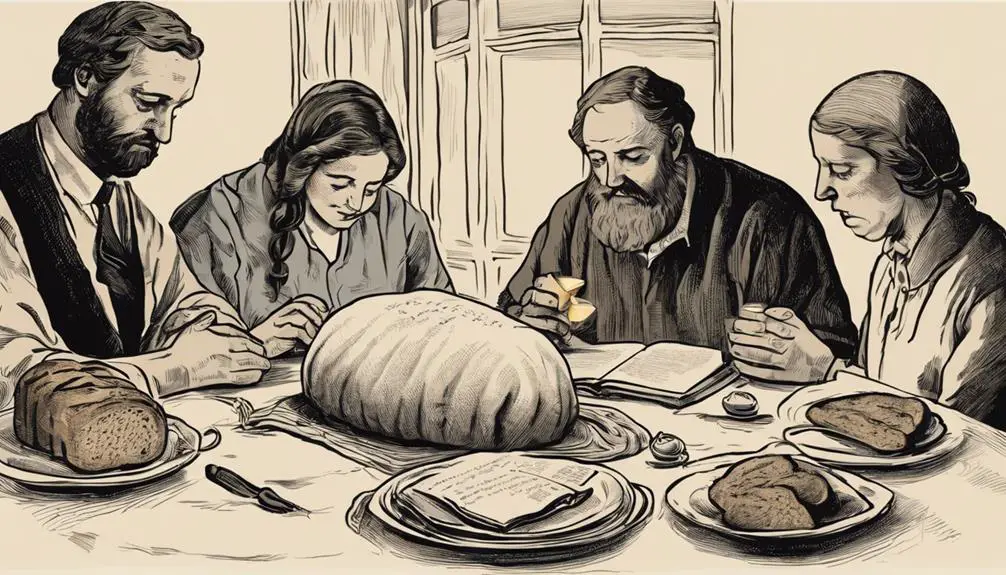Learn about the profound significance of Sabbath prayer in the Bible and how it marries faith, rest, and spiritual discipline.

Sabbath Prayer in the Bible
Sabbath observance, isn't it a fascinating concept, steeped in history and faith? You've likely considered it as a day of rest, as the Bible instructs, but there's more to it.
The practice of Sabbath prayer, an integral part of this day, is a tradition that goes beyond merely resting. Its origins, significance, and application in the Bible are engaging topics worth exploring.
Ponder this: what might we uncover about the relationship between faith, rest, and prayer when we examine Sabbath prayer in the lens of scripture? The answers may surprise you, encouraging a rethinking of your own spiritual habits.
Key Takeaways
- Sabbath prayer, rooted in ancient Israelite rituals, is a significant aspect of spiritual connection and rest as mandated in the Sabbath Commandment.
- Biblical narratives provide insights into Sabbath practices, emphasizing rest, worship, and significant prayer occurrences like Jesus praying in the synagogue.
- Observance and traditions of Sabbath have evolved, with various Christian denominations interpreting and adapting it differently, but maintaining the principle of rest and spiritual reflection.
- Modern Christian Sabbath prayer aligns with contemporary expressions of gratitude, confession, and guidance, emphasizing spiritual rest and relevance in today's world.
Biblical Origins of Sabbath Prayer

To unravel the origins of Sabbath prayer, you must delve into the Old Testament, where its roots are deeply embedded in the sacred rituals followed by the ancient Israelites. The Sabbath origins debate often circles back to these early religious practices, with scholars meticulously analyzing the text for clues.
Firstly, you've got to understand that Sabbath prayer isn't a standalone practice. It's part of a larger, complex system of worship that evolved over centuries. Prayer evolution theories suggest that early prayer forms were likely simple expressions of gratitude, requests for assistance, or rituals for appeasement of divine powers. The Sabbath, a day dedicated to rest and worship, naturally became a prime time for such spiritual communications.
Yet, the Old Testament doesn't provide a clear, detailed description of Sabbath prayers. Instead, it offers glimpses into the religious life of ancient Israelites, from which scholars infer the existence and nature of Sabbath prayer. You must remember, however, that these inferences are educated guesses at best. The exact origins and early forms of Sabbath prayer remain shrouded in the mist of time, a testament to the rich, complex history of this sacred tradition.
Understanding the Sabbath Commandment

Delving into the Sabbath Commandment, you'll discover it's a cornerstone of the Judeo-Christian tradition, deeply rooted in the biblical mandate for rest and worship. This Commandment, often referred to as the Fourth Commandment, is found in Exodus 20:8-11 and Deuteronomy 5:12-15. It instructs believers to set aside the seventh day of the week as a day of rest and reverence to God.
Analyzing the Commandment interpretation, it's clear that the Sabbath observance involves abstaining from work. However, it's not merely a day of physical rest, but also a day for spiritual rejuvenation. The Sabbath is viewed as a gift from God, a time for believers to cease from their labors, focus on God, and remember His creation and redemption.
In contrast, several Sabbath misconceptions exist. Some believe the Commandment is outdated or no longer applicable. Yet, the Sabbath's importance remains consistent throughout the Old and New Testaments. Others misconstrue the Sabbath as a restrictive obligation rather than a liberating opportunity for rest and reflection. Understanding these misconceptions allows for a fuller comprehension of the Commandment and its intended purpose – a testament to God's grace, a day set apart for rest and worship.
Significance of Prayer on Sabbath

On the Sabbath, prayer takes on a profound significance, offering believers a spiritual avenue for deepening their relationship with God, reflecting on His grace, and expressing gratitude for His creation and salvation. This day is unique, set apart for spiritual enrichment. Prayer, thus, becomes an essential component in your Sabbath observance, enhancing your spiritual growth and understanding.
In relation to 'Sabbath healing miracles,' these are often recounted in the New Testament, whereby Jesus performed miracles during Sabbath prayers, emphasizing the day's sanctity and divine favor. Moreover, the 'Sabbath in other religions' also holds a place of honor, with a focus on prayer and spiritual introspection.
Let's introduce a table that composes three main aspects of Sabbath prayer:
Aspect |
Significance |
Example |
|---|---|---|
Deepening Relationship with God |
Enhances spiritual connectivity |
Personal prayers |
Reflection on God's Grace |
Acknowledges His benevolence |
Prayers of gratitude |
Expressing Gratitude for Creation and Salvation |
Celebrates God's love and mercy |
Prayers for thanksgiving |
Biblical Examples of Sabbath Prayers

Drawing from the rich tapestry of biblical narratives, you'll find numerous instances where Sabbath prayers play a pivotal role, illustrating the profound importance of this spiritual practice. For example, take the Sabbath prayer of Jesus in the synagogue, as recounted in Luke 4:16-21. This event underscores the Sabbath Rest Importance, illustrating how prayer was used to reflect, connect, and communicate with God.
Different Sabbath Prayer Types are evident in the Bible, each with their unique significance. In Acts 16:13, Paul and his companions sought out a place of prayer on the Sabbath, demonstrating the communal aspect of Sabbath prayers. This gathering for prayer, often comprising psalms, hymns, and spiritual songs, embodies a shared reverence for the Sabbath.
Another instance is seen in Luke 6:12 where Jesus spends an entire night in prayer before selecting His twelve apostles. This indicates the importance of solitude and reflection, integral aspects of the Sabbath prayer.
These examples underline the profound role of Sabbath prayers in biblical narratives. They portray a deep sense of respect for the Sabbath, emphasizing the importance of rest, reflection, and spiritual connection through prayer.
The Sabbath Prayer in Modern Christianity

In modern Christianity, you'll find the tradition of Sabbath prayer continues to hold a fundamental place, reflecting the same reverence for rest, reflection, and spiritual connection as observed in biblical times. Contemporary prayer forms have adapted to the changes in societal norms and demands, but the core principles remain the same.
Analyzing the Sabbath Rest Impact, one can discern a significant influence on the believer's spiritual wellbeing. This practice promotes a healthier balance between work and rest, allows time for introspection, and fosters a deeper relationship with God. Moreover, it acts as a spiritual reset, rejuvenating the soul and equipping the faithful for the coming week.
The modern Christian Sabbath prayer, while maintaining its biblical roots, has embraced contemporary expressions. You'll find that prayers now often revolve around gratitude, confession, intercession, and guidance. They're not confined to the four walls of a church but extend to homes, outdoor gatherings, and virtual platforms, reflecting the evolving dynamics of worship.
In essence, the Sabbath prayer in modern Christianity underscores the faith's enduring commitment to spiritual rest and connection, showing its relevance and resonance in today's fast-paced world.
Practical Ways to Observe Sabbath Prayer

Observing the Sabbath prayer can be a transformative experience, and there are several practical ways you can incorporate this spiritual practice into your weekly routine. The first is committing to a regular time for prayer. Consistency fosters discipline, a critical aspect of spiritual development.
Next, consider the Sabbath prayer benefits. These include spiritual rejuvenation, a deeper connection with God, and a sense of peace. Acknowledging these benefits can motivate you to maintain your Sabbath prayer habit.
Prayer preparation techniques can also enhance your Sabbath prayer experience. These techniques involve creating a conducive environment for prayer and quiet contemplation. This might mean finding a quiet spot in your home, perhaps lighting a candle, or even playing soft, meditative music.
In addition to these, use a prayer guide or a Bible to help focus your thoughts. These resources can provide a structure for your prayers and guide your meditations.
Frequently Asked Questions
What Are Some Common Misconceptions About Sabbath Prayer?
You might think Sabbath prayer is rigid with many restrictions. However, that's a common misconception. It's not about strict rules but a time for spiritual reflection.
You may believe it's restricted to certain prayers, another misconception. It's more about personal communication with God. Don't confuse the Sabbath's reverence with rigidity.
It's a day of rest, reflection, and relationship with the divine, free from misinterpretations and undue prayer restrictions.
How Is Sabbath Prayer Observed in Different Christian Denominations?
You'll find that Sabbath prayer observation varies among Christian denominations due to differing Sabbath traditions. Some strictly adhere to Sabbath origins, resting and praying on Saturday, while others observe it on Sunday.
Some may focus on communal worship, others on private devotion. It's essential to understand that these variations reflect diverse interpretations and practices, not a lack of reverence or commitment.
Are There Specific Prayers That Should Be Recited on the Sabbath?
Yes, there are specific prayers traditionally recited on the Sabbath. These prayers can vary based on your denomination's Sabbath prayer traditions and origins. It's essential you understand the specific practices of your faith community.
Often, these prayers revolve around rest, reflection, and gratitude. However, the core of Sabbath prayer isn't the specific words, but the spirit of worship, peace, and connection to God.
What Are the Differences Between Sabbath Prayer and Regular Prayer?
You're asking about the differences between Sabbath prayer and regular prayer.
In terms of Sabbath history, the Sabbath prayer is unique, as it's tied to a particular day of rest and worship. The prayer's significance hinges on this context, setting it apart from regular prayers.
It's not just about the words spoken, but the timing and intention behind them. So, while all prayers are important, the Sabbath prayer holds a special place due to its historical and ritual context.
How Does Sabbath Prayer Impact One's Spiritual Growth in Christianity?
Sabbath prayer can significantly impact your spiritual growth. It's a firm expression of your prayer discipline, setting aside dedicated time for spiritual engagement.
This regular, focused communication with God can lead to spiritual renewal, deepening your faith and understanding.
It's not just about the act of prayer, but also the commitment to this sacred routine, demonstrating your devotion and fostering a closer relationship with God.
Conclusion
In sum, Sabbath prayer profoundly roots in biblical traditions, underscoring the need for rest and spiritual reflection. The Bible vividly illustrates the value of such prayer, setting an example for modern Christians.
Your observance of Sabbath prayer not only adheres to an ancient commandment but also enriches your spiritual life. So, take practical steps to incorporate this essential facet of faith into your weekly routine and experience its transformative impact.



Sign up